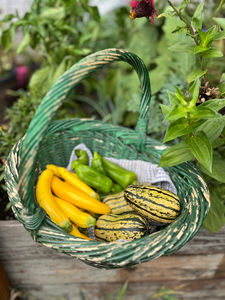WILD PEACE SANCTUARY


GROWING FOOD
Alongside our regenerative work, we grow vegetables, fruit trees, flowers, and herbs, in partnership with local organic agricultural non-profit, R.O.A.D. for Change, using our own organically made compost and fermented liquid plant fertilizers.
We save seeds, rotate crops, and practice companion planting to discourage disease, attract beneficial pollinators and other insects, and to increase the health of our crops. We weed by hand rather than using mechanical control, and use natural mulches and cover crops rather than relying on persistent herbicides and synthetic fertilizers.
To ensure the manure we collect from our equines is clear of contaminants, we use herbal dewormers and test any hay we feed to our animals for herbicides.
MAKING COMPOST
We make organic compost from the raw fertilizer provided by our equines, organic matter cleared from the land such as fallen leaves, pulled plants, and coastal amendments, such as crab and oyster shells. Our fermented liquid plant fertilizers are made from mineral-rich plants that we wild-tend and/or cultivate on the land such as stinging nettle, dandelion, comfrey, and horsetail. Once our concentrated fertilizers are fermented and ready to use, we dilute them and feed them to our vegetable gardens and fruit trees.
Compost is made from organic matter such as plants, leaves, and animal manure that has been broken down biologically into a relatively homogenous and stable soil amendment. Making compost promotes healthy microbe growth, sequesters carbon, and creates a nutrient-rich soil environment which enables plants to feed themselves. Compost added to the soil supports it to retain more moisture, boosts resistance to plant disease, aerates the soil, and promotes plant growth. Compost is essential for growing food.
Using organic fertilizer eliminates reliance on synthetic fertilizer made from industrially extracted minerals and fossil fuels. Synthetic fertilizer kills microorganisms and builds up as salt in the soil, killing beneficial organisms such as earthworms, and forcing the use of more fertilizer over time. The buildup of synthetic fertilizer in soil creates a cascade of problems, such as making it more acidic over time and generating unwanted plant life in water sources, including algae, which further disrupts the ecosystem. It can take many years for the chemicals in synthetic fertilizers to dissipate through the ecosystem.
We donate our organic compost and fermented liquid plant fertilizers to several local food security projects and environmental organizations, including the native pollinator project run by local non-profit, Concerned Citizens for Clean Air, a 25 mile herbicide-free pollinator corridor on the Oregon coast, the community gardening program at Newledo Hub, and the Tribal Farm at the Confederated Tribes of Siletz Indians (CTSI).
LEARN MORE


The Possibilities of Regeneration

Into the Soil: Growing Food, Community, and a Life Beyond Profit

Common Ground documentary - Official Trailer
The people cannot be healed until the land is healed, and the land
cannot be healed until the people are healed - by the land.”
~
Martin Prechtel



























